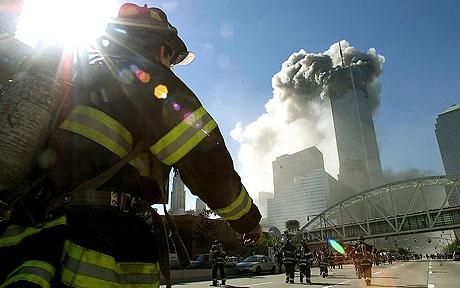
Could this inside information by an FBI Agent in 2001 have stopped the 9/11 terror attacks?
Former FBI special agent Mark Rossini worked within the highly secretive ‘Alex Station’ unit, the cover name for the CIA’s Osama bin Laden unit.
When Rossini and colleague Doug Miller found out about two well-known Al-Qaeda operatives were arriving in the US in 2000 they wanted to inform FBI headquarters – but they were blocked from doing so by the CIA.

BYPASS THE CENSORS
Sign up to get unfiltered news delivered straight to your inbox.
You can unsubscribe any time. By subscribing you agree to our Terms of Use
One of the terrorists, Khalid al-Mihdar, had been granted multi-entry visas to the U.S. Khalid al-Mihdar went onto being one of the hijackers in the 9/11 attacks. If Rossini had been allowed to inform others at the agency about these known terrorists over a year before the attacks – the attacks would probably never have happened.
Acting on CIA orders – regrets
Newsweek.com reports:
All these years later, Rossini still regrets complying with that command. If he had disobeyed the gag order, the nearly 3,000 Americans slaughtered on 9/11 would probably still be alive. “This is the pain that never escapes me, that haunts me each and every day of my life,” he wrote in the draft of a book he shared with me. “I feel like I failed, even though I know it was the system and the intelligence community on the whole that failed.”
The various commissions and internal agency reviews that examined the “intelligence failure” of 9/11 blamed institutional habits and personal rivalries among CIA, FBI and National Security Agency (NSA) officials for preventing them from sharing information. Out of those reviews came the creation of a new directorate of national intelligence, which stripped the CIA of its coordinating authority. But blaming “the system” sidesteps the issue of why one CIA officer in particular, Michael Anne Casey, ordered Rossini’s cohort, Miller, not to alert the FBI about al-Mihdhar. Or why the CIA’s Alec Station bosses failed to alert the FBI—or any other law enforcement agency—about the arrival of Nawaf al-Hazmi, another key Al-Qaeda operative (and future hijacker) the agency had been tracking to and from a terrorist summit in Malaysia.
It remains a mystery. None of the post-9/11 investigating bodies were able to get to the bottom of it, in part because Rossini and Miller, who continued to work at Alec Station after the attacks, didn’t tell anyone what happened there. When congressional investigators came sniffing around, they kept their mouths shut.
“We were told not to say anything to them,” Rossini said. Who told you that? I asked. “The CIA. I can’t name names. It was just understood in the office that they were not to be trusted, that [the congressional investigators] were trying to pin this on someone, that they were trying to put someone in jail. They said [the investigators] weren’t authorized to know what was going on operationally.… When we were interviewed, the CIA had a person in the room, monitoring us.”
As a result, Rossini wasn’t interviewed by the subsequent 9/11 Commission, either. “Based on that interview, I guess the 9/11 Commission [which followed up the congressional probe] thought I didn’t have anything worthy to say.” He kept his secret, he said, from the Justice Department’s inspector general as well. “I was still in shock,” he added, and still fearful of violating Alec Station’s demand for omerta. Finally, when his own agency—the FBI’s Office of Professional Responsibility (OPR)—came to him in late 2004, after the congressional probe and 9/11 Commission had issued their reports, he opened up.
Read more: The Inside Information That Could Have Stopped 9/11

Be the first to comment